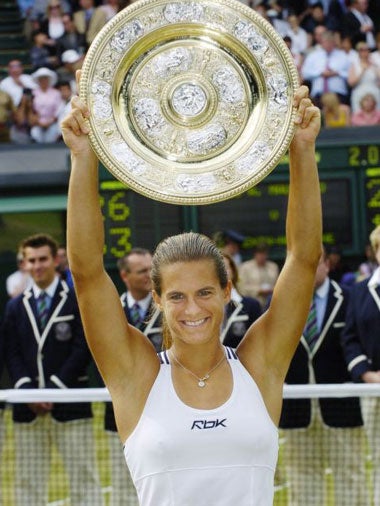No choking, Mauresmo is a real winner at last
French player fights back and holds her nerve to overhaul Henin-Hardenne for second Grand Slam and erase questions over Australian victory

One decisive way to sweep away all your doubts about nerves and self-induced defeats is to go out and win Wimbledon. That is what Amélie Mauresmo did on Centre Court, battling back to see off the sturdy challenge of Justine Henin-Hardenne after being overwhelmed in the opening set. She needed two hours and two minutes to win 2-6 6-3 6-4, have a quick weep, climb up to the VIP box to embrace her long-time coach, Loïc Courteau, and then accept and cling on to the Venus Rosewater Dish as if she never intended to let go of it again.
"I don't want anybody to talk about my nerves any more," she said in her victory speech. Nor will they. Eventually she emerged, and deservedly so, as the woman whose nerve held the steadier in a match of strangely variable quality, mishits and errors mixing with sumptuous winners.
This second Grand Slam of the year following a rather hollow triumph by default over an ailing Henin at the Australian Open in January confirms Mauresmo's status as world No 1. As for Henin, attempting the most difficult double in tennis, winning successive major titles on the clay of Paris and grass of London in just over a month, turned out to be too daunting.
With five former great Wimbledon champions - Angela Mortimer, Maria Bueno, Margaret Court, Ann Jones and Virginia Wade - watching from the Royal Box, Mauresmo picked up a cheque for £625,000, an amount which, although marginally smaller than the men's prize, is probably a good deal more than those five earned between them from the greatest of all tennis tournaments.
Both women had promised to attack and Henin wasted no time, racing in to the net on the first point to put away an overhead and going on to startle Mauresmo, breaking her in that opening game. Henin's brisk military stride between points was evidence of her determination not to be overawed by giving away height and weight in this French-Belgian confrontation which in boxing terms would have been cruiser versus bantam.
These two possess the finest one-handed backhands in the women's game, but it was Henin who made better use of that stroke, and most others too, in an opening set of half an hour. Both had trouble with their timing in the gusting wind, and Mauresmo was slower into her stride, troubled by the quality of the Belgian's returning.
A grotesque mishit by Mauresmo set up Henin for a second service break which she clinched by directing a service return to the Frenchwoman's ankles as she charged the net. Leading 5-2 and looking so much the more assured performer, Henin closed out the set to love with a service winner off Mauresmo's racket frame, followed by her first and only ace.
Though the wind abated in time for the start of the second set, the errors mounted and Henin was assailed by the sort of doubts she rarely suffers from. To cries of "Allez, Amélie", Mauresmo jumped, or perhaps more accurately, staggered, into a 3-0 lead. To have described the standard in that second set as patchy would be over-generous.
Three successive volleying errors from Henin offered Mauresmo the chance for a 4-0 lead, but it was spurned, as was a further break point which would have seen her go 5-1 up. The Belgian struggled back into contention with a service break to trail 3-4, only to hand over her own delivery meekly.
Time for Mauresmo to show what she was made of and serve out for the set to level this match. Typically, she endured three break points before sending Henin packing with an ace. So, with her husband Pierre Yves Hardenne chewing his fingernails anxiously in the VIP section, Henin attempted to put the disasters of the second set behind her and claim the only Grand Slam which has so far eluded her.
She was, alas, destined to finish runner-up, just as she did to Venus Williams, in her first Grand Slam final, the Wimbledon of 2001, virtually as soon as Mauresmo's break of serve for a 2-1 lead visibly swelled her confidence and authority. As belief was reborn, as all those Roland Garros failures and the public jeers which accompanied them were put behind her, Mauresmo began to play the riveting, athletic tennis which has made her the most entertaining female player of her generation.
The serves were crunched in, the volleys were punched away, the backhand flowed like molten gold. The lady was unstoppable. As she perceived that the waters were about to close over her head, Henin upped her own game frantically but it was too late. The afternoon, and the title she coveted above all others, were slipping away from her.
So, at 4.08pm, Mauresmo led 5-4 and prepared to serve for that historic Dish. She chewed on an energy bar, had a swig from a bottle, buried her face in a towel and strode forth; 15-love with her seventh ace, 15-all as she charged the net and was passed; 30-15 on ace No 8.
Then, anticipating match point on the next exchange, she let a Henin return sail overhead, thinking it was going out. Instead, the ball fell in. That would have been enough for the Amélie of old to collapse.
This time she took a breath, reached championship-winning point with as firm a volley as she had struck all afternoon, and then let Henin finish the job for her by netting a forehand. France had its first women's Wimbledon champion since Suzanne Lenglen won the last of her six titles in 1925.
Join our commenting forum
Join thought-provoking conversations, follow other Independent readers and see their replies
Comments
Bookmark popover
Removed from bookmarks